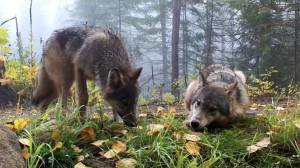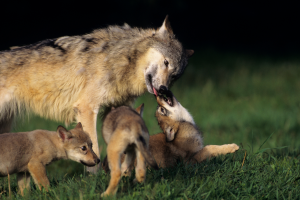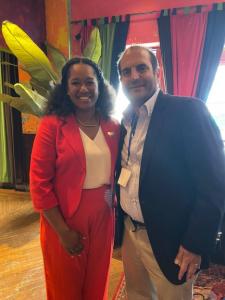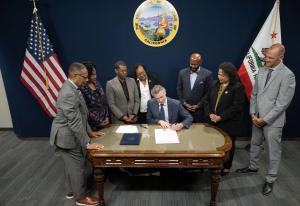
Two wolves are caught on a trail camera set by the Washington Department of Fish and Wildlife.

A wolf plays with pups from its pack.

Washington Wildlife First aims to transform state wildlife management to emphasize conservation over consumption.
WA Wildlife Commission defeats proposal to remove state endangered-species protections from gray wolves and approves a rule to curb excessive cougar mortality. The commissioners took a brave stand against the entrenched special interests that have long taken aim at the state’s carnivores while ignoring the vital role they play in maintaining biodiversity.”
— Claire Loebs Davis OLYMPIA, WASHINGTON, UNITED STATES, July 20, 2024 /EINPresswire.com/ -- The Washington Fish and Wildlife Commission (Commission) took an important step Friday toward protecting the state’s large carnivores and preserving biodiversity, by voting to retain state endangered-species protections for gray wolves and to approve a rule limiting cougar mortality in advance of the 2024-25 hunting season.
“We are grateful to the commissioners for carefully examining the science and facts before them and making the right choice for Washington’s wolves, cougars, and the ecosystems that depend upon these keystone species,” said Washington Wildlife First President and Executive Director Claire Loebs Davis.
“The commissioners took a brave stand against the entrenched special interests that have long taken aim at the state’s carnivores while ignoring the vital role they play in maintaining biodiversity,” she said.
During a webinar Friday morning, the Commission voted 5-to-4 to defeat a recommendation by Washington Fish and Wildlife Department (Department) management to downlist wolves from “endangered” to “sensitive” on the state endangered species list. The Department made the recommendation even though wolves have not met the standards for downlisting set by the state’s Wolf Conservation and Management Plan, and have not returned to the largest of the state's three recovery zones..
The discussion and vote on the wolf downlisting proposal took several procedural twists and turns . Ultimately, Commission Chair Barbara Baker, Vice Chair Tim Ragen, Wildlife Committee Chair Lorna Smith, and Commissioners Melanie Rowland and Woody Myers opposed downlisting wolves, while Commissioners Molly Linville, Jim Anderson, John Lehmkuhl, and Steve Parker supported motions to downlist wolves to either “threatened” or “sensitive” status.
“Washington’s wolves face numerous threats that the Department failed to take into account in its downlisting recommendation, including a doubling of wolf mortality levels over the past three years due to increased poaching and tribal hunting,” said Dr. Fran Santiago-Ávila, Washington Wildlife First’s Science and Advocacy Director.
“Science tells us that a decision to downlist wolves would have put the population at even greater risk, so we are relieved and grateful that the Commission decided to keep current state protections in place,” he said.
In recent weeks, Washington Wildlife First and other advocates have challenged the credibility of the Department’s 2023 Annual Wolf Report. It reported an increase in the state wolf population to 260 wolves, but contained a large amount of data that the Department was unable to verify or describe how it had been gathered.
Advocates have also expressed alarm at the growing trend of non-tribal livestock owners evading state wolf protections by hiring tribal members to kill wolves on their behalf in northeast Washington, where most of the state’s wolves live. The Confederated Tribes of the Colville Reservation allow tribal members to hunt wolves year round with no limits, on both the reservation and the “North Half,” the ceded territory that reaches north from the reservation to the Canada border.
“Whether the state has 260 wolves or 200, it is a biologically small and fragile population that is present in only two of the three recovery zones outlined by the state wolf plan,” said Dr. Santiago-Ávila. “The discussion over wolf management has become so skewed by politics and special interests that it is easy to lose track of this reality—with any other species, I cannot imagine the Department would have even considered removing endangered species status when there are so few individual animals in the state.”
At Friday's meeting, the Commission also voted 8-to-1 to approve a new rule to limit human-caused cougar mortality to no more than the population’s growth rate, with only Commissioner Molly Linville dissenting. That rule was prompted by a rulemaking petition brought last year by Washington Wildlife First and seven other wildlife advocacy organizations. The petition sought to bring an end to six years of overexploitation of the cougar population, during which annual human-caused cougar mortality has averaged between 20% and 50% of the population in 16 state population management units.
Under the rule approved Friday, the state will consider all human-caused mortality of independent-aged cougars (cougars over 18 months old) and cap hunting so that overall annual mortality does not exceed 13% in each population management unit.
“Washington’s cougar management has been controlled by politics rather than science for far too long,” Davis said. “The rule approved by the Commission follows long-standing recommendations from Department scientists, who emphasize that the best way to maintain a stable and sustainable cougar population is to ensure that mortality levels in each management unit do not exceed the growth rate. It is gratifying that the Commission is finally listening to the groundbreaking science done by its own biologists.”
Dr. Santiago-Ávila emphasized that science shows that cougars, like all large carnivores, regulate their own population numbers and do not need to be hunted.
“If hunting is allowed, we have a moral responsibility to mitigate the harm that it causes to cougars, humans, and their domesticated animals,” he said. “Not only is there a scientific consensus that killing more cougars does not decrease the human-cougar conflicts that people worry about; there is significant evidence suggesting that by killing too many cougars nand destabilizing the population, hunters and management agents might actually be increasing the risk of conflicts and predation on domesticated animals, and thus making people and their animals less safe.”
Davis said the Washington pubic played a crucial role in both votes. “More and more Washingtonians are paying attention to the crucial wildlife management decisions being made at the state level and starting to involve themselves in that process,” she said. “In advance of these momentous votes, thousands of Washingtonians spoke up on behalf of the state’s wolves and cougars, and it is clear that the Commission heard them.”
Claire Loebs Davis
Washington Wildlife First+1 206-601-8476[email protected]Visit us on social media:FacebookXInstagram
You just read:
News Provided By
Claire Loebs Davis, Washington Wildlife First
July 20, 2024, 07:23 GMT
EIN Presswire's priority is source transparency. We do not allow opaque clients, and our editors try to be careful about weeding out false and misleading content. As a user, if you see something we have missed, please do bring it to our attention. Your help is welcome. EIN Presswire, Everyone's Internet News Presswire, tries to define some of the boundaries that are reasonable in today's world. Please see our Editorial Guidelines for more information.
Originally published at https://www.einpresswire.com/article/729053991/washington-wildlife-first-hails-momentous-votes-by-state-wildlife-commission-to-protect-wolves-and-cougars






